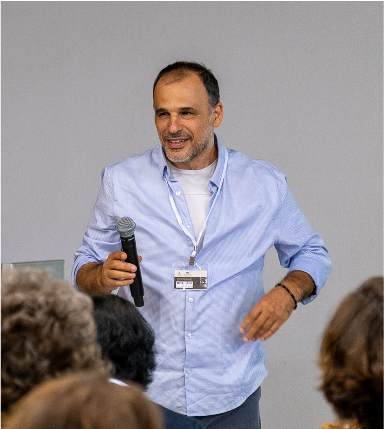Embracing Parkinson
Hi friends,
I was diagnosed with Parkinson's Disease (PD) six years ago, and on the day of the diagnosis I thought: tomorrow I will move to a wheelchair, and a day later I will die.
Well, I'm still alive.
I believe that PD "hit me" because I was handling myself in a chronically "too-challenging" manner. This behavior jeopardized my well-being to a point that my body decided to change its life-long strategy of stillness and switch to shaking/tremor-ing and to freezing. As a biologist, I believe that for our body, it's all about survival. When our body faces a threat, especially a chronic one, it searches for solutions to deal and ease the threat.
Why a tremor and/or a freeze?
Let me turn to Dr. Peter A. Levine, the father of Somatic Experience (SE) and the author of the book "Waking the Tiger: Healing Trauma". In his book, Dr. Levine explains that when animals face a threat (like a predator) they have three options, the three F's, to deal with this threat: Flee, Fight, or Freeze. In all three, enormous energy is generated (via our Mitochondria), and in the Flee or Fight mode this energy is consumed, whereas in the Freeze mode it's not.
This caged energy needs to be released somehow, and animals do this by shaking (like shaking off/out the threat). So, shaking in animals is good and seems to be a critical instinct for curing the trauma and going on with a healthy life. Us, human beings, lost this ability.
Why?
I'm not an expert in this field, but it seems that a part in our brains called the neocortex, suppresses our more primitive brain, the reptile brain, which is in charge in animals for many survival instincts, and among them the "shaking post freezing" behavior.
Do humans also freeze in response to a threat?
I believe that throughout our life we are exposed to relatively small incidents of trauma, that I would like to refer to as incidents of freezing. Since we lost the ability of "shaking post freezing", the energy that was supposed to be released remained caged, and is probably doing some harm, especially if there are many incidents, and some of them are big.
So is it possible that PD patients start to shake to release all the freezing incidents they experienced throughout their lives? I often feel like a spring that is constantly unwinding to release the accumulated tensions. Why at the age of 50 or 60 or even nowadays at much earlier ages? Perhaps the number and severity of the incidents reached a certain threshold in which the body decided it is too harmful, and that investing energy into keeping our body still is not the right strategy anymore for survival.
Thus, I decided to embrace my tremor and my body's new strategy of living. It's the New Shaking Atan that holds hands with his body and does not fight it, as if PD is a terror attack of an external intruder. Is it difficult to accept my PD? Am I ashamed of my tremor? Very often I am, especially when people feel sorry for me and say "...but you are so young...".
In my next blogs I will discuss: what I believe is special in the nerve systems of people that get PD, why do PD patients freeze, additional strategies to accept my PD, how mitochondria malfunction may contribute to the initiation/progression of PD, and more.
Thank you for listening.

Comments
Post a Comment